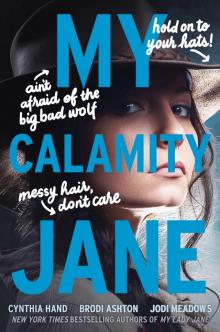- Home
- Cynthia Hand
My Calamity Jane Page 15
My Calamity Jane Read online
Page 15
Winnie’s green eyes scanned the page. “It says to go to a place called the Gem, and talk to a man named Al Swearengen. It also says that the price for the cure is one hundred dollars.”
Jane sucked in a breath. (As we’ve already established, dear reader, one hundred dollars was a lot of scratch.) “Dang, that’s a lot of scratch.”
Winnie’s brow rumpled. “Jane. Are you interested in this cure because you . . .”
Jane shook her head. “Me? No, no, no, I’m not interested for me. I’ve got a . . . friend . . . who was bit . . . recently.”
“You’re asking for a friend.”
“Yep. That’s what I’m doing.”
“Well, I hope your friend is okay,” said Winnie.
“She’s fine. She’s going to be fine, anyway. Thanks.” Jane took the paper back and moved to the door. Then, she turned and stared ruefully at Winnie. “I, uh, I’ve got to take a trip.”
“Is this because of your friend?”
“Could be.”
“Oh. I’m sorry to hear that.”
“I just wanted to say, in case I don’t see you for a while, or, like, ever again, that I really liked you.”
Winnie’s smile was like a flower blooming. “I like you, too. So much.”
Jane found herself smiling, too. “You’re sweet.”
“Why, thank you. I hope I do see you again.”
“Me too.” This was one of those times, dear reader, when Jane should have said goodbye and left but couldn’t seem to bring herself to do it, so she kept babbling nonsense. But then she thought of something she really did want to say. “Can I ask you for a favor?”
“Of course. We’re friends, now,” Winnie said without hesitation. “Ask me for anything, and if I can do it, I shall.”
Jane felt a pang of wistfulness at the word friends. It was nice, hearing Winnie say that, but it didn’t feel exactly true.
“Can you not write about me?” Jane asked. “Can we be friends, without me being the subject of one of your stories? Ever? No matter what happens?”
Winnie seemed taken aback (which we, as the narrators, think is saying something, because she didn’t even blink twice at the incident with the hairball), but she regained her composure quickly. “All right. Yes. I won’t write about you. Not directly, anyway.”
“Promise?”
“I promise.”
“Thanks.”
“You’re welcome.”
“Well.” Jane tipped her hat. “I’ll be seeing you,” she said, and ran off before Winnie could say anything else to make her want to stay.
Getting back into her room was even trickier than getting out had been. First, she had to go outside again and climb a helpful tree next to the building to get up to the roof. Then she had to remember which window was hers and Annie’s. Then, when she’d figured out which window (thanks to the gingham curtains Annie had sewed only yesterday), Jane had to work it so that she could swing herself gracefully back through the window. Except not gracefully, because she crashed through instead of swung through, and then she landed again on her sore ankle. Then she jumped to her feet and tried to act like she’d been there all along. (Again, we’d like to point out, she could have used the door.)
“What was that?” she said loudly. “It sounded like a crash. I hope nobody’s breaking in. This would be the wrong room to try to break into, if you know what I’m saying. On account of all the guns we got.”
In response, Annie turned over onto her back and snored delicately.
Jane had to go—now, she felt—but then she remembered that she didn’t have any money. She’d drunk it all up. She was going to need money, for a train ticket, maybe, or provisions to get herself to the Black Hills.
She bit her lip, thinking it over. She knew where Annie kept her money—in a little calico purse on the bedside table. She slunk over and picked it up. Inside was twelve dollars and fifty cents. Not enough to get Jane to Deadwood, but enough to get her out of town.
She stared down at Annie’s innocent sleeping face.
“Hey, Annie,” she said quietly. “Can I borrow ten dollars?”
Annie’s response was a wheezy rattle in the back of her throat. But that was good enough for Jane.
“Thanks, you’re a pal,” she said, and stuffed the ten into her own wallet. Of course she would pay Annie back, when she got herself straightened out. Sometime. Maybe.
“I wish I could give you that thing, where I say ‘I owe you’? What’s that called?” Jane shrugged and dug in her pocket for the prettiest item she owned, because she knew Annie had a liking for pretty things. It was a smooth piece of rose quartz she’d picked up along a trail a while back. She set it on top of the remaining two dollars and fifty cents in Annie’s purse. Then Jane moved quickly around the room, stuffing the rest of her meager belongings into a satchel. She wished, for what felt like the thousandth time in her short life, that she could write. She would write a letter to Bill. To Frank. To Charlie. Heck, to Annie even. She would tell them all goodbye, and how much they’d meant to her. Especially Bill.
She didn’t know what he’d do if he learned she was a garou. She prayed that one day she would not find herself on the business end of his pistol.
There was a light tap at the door.
“Jane,” came Frank’s voice. “Jane, open up.”
“We need to talk to you,” said Bill. “It’s important.”
Well, shoot. Jane knew she couldn’t talk to Bill or Frank, not now. True, she had just been wishing that she could say goodbye, but a face-to-face goodbye would require too much explanation on her part. It was best if they didn’t know about the bite. Or maybe they did know about the bite, somehow, and were here to confront her about it. In any case she thought the best course of action was to go off real quick, get the garou situation taken care of, and come back good as new without any fuss.
Yep. That sounded like a plan.
Jane ran to the window and slung her leg over the sill. (We concede that it was necessary for her to exit via the window this time.) She tipped her hat in the direction of the door, and then slid out into the night air.
“Goodbye, y’all,” she said.
And then she was off to see about that cure.
TWENTY
Frank
Yep. Jane was a woof. Frank couldn’t wrap his head around it.
Let’s back up to when Jane was walking down the boardwalk earlier. What she didn’t know was that Frank was watching her. She seemed lost in thought, obviously unaware of her surroundings, because before Frank could catch up with her, she tripped over a golden retriever.
And here was where it got weird. She yelled at the dog. And then promptly had words with it. Frank wasn’t close enough to hear the dog’s thoughts, but he knew a conversation when he saw one.
That’s when things snapped into place. Jane’s strange behavior after the factory raid. Her distracted conversations. Her bushy eyebrows, which Frank had assumed was just dirt. And now she was talking to a dog the way Frank talked to George.
Jane was a garou.
No wonder she’d been distressed lately. She probably felt so alone. Frank knew that feeling of bearing such a heavy secret, and he didn’t know what he would’ve done without Bill’s guidance.
It was Bill who had rescued him from the garou who had killed his family. (That part of the show was true, but Bill hadn’t reached baby Frank before the garou had bitten him that fateful night, a detail they changed in the retelling of the tale.) It was Bill who had taught Frank to control the wolf.
They’d worked on it constantly when he was a child. Any time that Frank got angry, even at the smallest thing, Bill would practice the Wooo with the young boy, and stay by his side as Frank learned to settle the wolf.
Jane could learn to do it. With Frank’s and Bill’s help.
What she needed now was to know the truth about Frank. He had kept his secret for so long, he wondered how it would feel to say the words out loud to another pe
rson.
I’m a garou.
Another troubling thought emerged. If Jane was a garou, was it dangerous to keep Annie around? One garou could stay a secret, especially one as practiced as Frank. But a second one, who had arguably the biggest mouth this side of the Mississippi? (And by that, we mean both sides.) If Annie found out, people could get hurt.
He kicked at the dirt.
Bill would know what to do.
When Frank got to Bill’s room, he found it empty. He went downstairs to see the manager, who was chewing on a toothpick.
“Hey, you seen Wild Bill?” Frank asked.
The manager removed the toothpick from his mouth and used it to point. “He’s at the Kauffman Saloon.”
Contemplating the best way to tell Bill the news about Jane, Frank made his way there. The poker room was saturated with smoke and the smell of whiskey.
Bill was sitting at one of the tables, but as usual, he was in his corner with his back to the wall, making it impossible for Frank to lean down and whisper.
“Hey, Dad. Can I speak to you?” Frank said.
“I’m in the middle of a hand. Is it important?” Bill kept his eyes on the pile of chips in the center of the table.
Well, of course Frank wouldn’t interrupt poker if it wasn’t important.
“It’s about Jane,” Frank said. “She needs some help with . . . that . . . book about garou.”
“Jane’s always been able to take care of herself,” Bill said, checking his cards again.
“Yeah, I don’t think this is one of those times.”
A man across the table sighed loudly. “Are we gonna play cards, or are we gonna start a book club?” (Reader, this was before book clubs were a thing, so the man considered himself very clever.)
“I’ll be done in a bit,” Bill said.
Frank rolled his eyes. If Bill would only look at him, he could wink. “She’s gone and gotten herself into . . . a hairy situation. With a bad batch of moonshine.”
Finally, Bill looked up. Frank nodded.
“I fold,” Bill said.
The entire way back to the hotel, Bill was saying things like, “Now don’t scare her off. You know how jumpy Jane can be,” and “We’ll tell her how you handle the wolf,” and “Don’t be too critical of her behavior.”
At this one, Frank scoffed. “I’m never critical.”
Bill shot him a knowing look.
“Okay, okay,” Frank said.
They got to Jane’s room and knocked, but there was no answer.
“Jane.” Frank could hear the urgency in his own voice. “Jane, open up.”
“We need to talk to you,” said Bill. “It’s important.”
From the other side of the door, they heard a thump and then a scuffle and then nothing.
“Stand back.” Frank kicked open the door, but when they stumbled in, they found one bed full of Annie, and the other one empty. Frank felt a breeze. The window was open.
He rushed over to the window to see Jane jumping onto the back of a passing stagecoach.
“Darn it.” Frank looked down at Annie, who was snoring lightly. And cutely, he might add.
“How did she sleep through Jane jumping out the window and us kicking in the door?” Bill asked.
“I don’t know,” Frank said softly, still gazing at her. “She must be a heavy sleeper.”
Bill cleared his throat. “Um, Frank?”
“Yes?”
“You should probably stop staring at her now.”
“Sorry,” Frank said.
“We’ve got to find Jane,” Bill said. “Where do you think she’s headed?”
“Toward the nearest watering hole?”
“I don’t think so.” Bill had opened the wardrobe by Jane’s bed, and there were only Annie’s clothes inside.
Frank sank onto the empty bed. “Why would she leave? Where would she go?”
“Don’t know. She’s got siblings in Salt Lake City. Maybe she’ll head out west.”
Frank put his head in his hands and stared at the floor, where he saw the corner of a paper sticking out from under the bed. He picked it up, and read the headline. “Maybe she’s not running away. Maybe she’s running toward something.” He held up the paper. “A cure for the wolf? In Deadwood? Jane wouldn’t believe this, would she?”
Bill sighed. “Becoming a wolf can make a person desperate. But at least we know where she’s going. Let’s head her off at the station.”
“What about Annie?” Frank said.
Bill smiled sadly. “She was fine before us, she’ll be fine without us.”
But would Frank be fine without her? His chest squeezed at the thought of leaving her without saying goodbye, but maybe it was for the best.
Bill’s hand came down on his shoulder and squeezed. “Let’s go,” Bill said. “Time is of the essence.”
A few minutes later they were standing outside the livery, where they discovered that Bullseye (Jane’s horse, as you’ll remember) was gone. Black Nell, Mister Ed, and Charlie’s horse weren’t in the barn either. Even the donkey, Silver, was missing.
They walked around to the back of the livery to the gated corral. Their horses and the donkey were scattered about. Bullseye wasn’t there.
“That . . . She . . .” Frank was so mad he couldn’t form words.
Bill tipped his hat. “You gotta admit, she can be shrewd when she wants to be. Let’s round ’em up.”
By the time they rode to the station, the train to Chicago (the most straightforward way to Deadwood) had already left. Presumably with Jane on it.
“Time to go pack our bags,” Bill sighed.
As they were leaving the station, two men in the corner caught Frank’s eye. One was Jack McCall, the other a man Frank didn’t know. But he had the biggest handlebar mustache Frank had ever seen.
The hairs rose up on the back of Frank’s neck. “It’s Jack again.”
“Don’t alert him to our presence,” Bill said. “I don’t trust that Jack McCall.”
“Why?” Frank asked.
“Just a feeling,” Bill said.
They watched McCall as he handed the other man a roll of bills.
“Well that’s not suspicious at all,” Bill remarked.
“Why do you think he’s paying him?” Frank whispered.
“I don’t know.” Bill tilted his hat lower over his face. “That’s something we can look into, after we find our Jane.”
TWENTY-ONE
Annie
Annie had been robbed.
Frantically, she searched through the drawers and wardrobe and even under her bed, in case her money had migrated to better climates, but everywhere she looked, her money was not there.
Oh, some of it was. There was still two dollars and fifty cents, along with—mysteriously—a pink rock about the size of her thumbnail. But a whole ten dollars was missing.
“Argh!” she cried, because money didn’t just get up and walk away. Money certainly didn’t change into rocks overnight.
It hadn’t been much money, but it was all her earnings from the show—everything she hadn’t sent to her family—and she’d been counting on it to get her through the next couple of weeks. Show business paid, but it didn’t pay that well.
Someone knocked on the door.
“What do you want?” she yelled, digging through the trunk below the window. It had to be here somewhere. It had to be.
“Annie, it’s me,” Frank said from the other side of the door. “We need to talk.”
That was never a good sign. Annie jerked up straight and hit her head on the windowsill. “Darn it to heck!” she swore, and somewhere in Darke County, her mama steamed up in outrage and didn’t quite know why.
“Are you all right?” A note of urgency filled Frank’s voice. “Can I come in?”
“Yes.” Annie rubbed the back of her head as the door opened and Frank stepped inside. He wore his brown coat, tall boots, and a worried frown. Annie was suddenly grateful she’d dres
sed first thing, before she’d gone looking for all her worldly possessions.
“What happened?” Frank asked, looking her over for injury. “You’re not bleeding.”
“No,” she agreed. “But I think I was robbed. I should check if Jane—” At last, she glanced around the room and realized that Jane’s side was empty. “Where is Jane, anyway?”
“That’s what I’ve come to talk to you about.”
“About Jane?”
Frank nodded.
“What about Jane?”
“I’m sure you’ve noticed that she’s gone.”
“Just now, yes.” This was going to be an awkward conversation. Annie could tell. “I was distracted by the realization that I’ve been robbed. Ten dollars is gone. Mr. Frost should be alerted to the presence of a thief right away.”
Frank sighed. “It was probably Jane who robbed you.”
“What?” It came out like a shriek. Annie took a breath and lowered her voice. “Why would she do that?”
“Because she wanted to go to Deadwood, but she drank all her own money away.”
Annie scowled. “She stole my money so she could go to Deadwood?” That didn’t make sense. Well, it did, sort of, because Jane had been drinking an awful lot. A worrying amount, really. But if Jane had needed money she should have asked. Not that Annie would have funded her drinking habit, but— The rest finally caught up with her.
“Wait, Jane is in Deadwood?”
“Yes,” Frank said. “I mean no. I mean not yet. She’s going there. She left this morning and we need to go after her. Not Charlie, obviously. He’s in no shape to travel, and he needs to stay here to await orders, but yes, Deadwood.” He caught Annie’s utterly baffled look and dragged his hand down his face. “I’m not explaining this well.”
“All right. Can you start from the beginning?”
“Probably not,” he admitted.
“Mr. Utter is awaiting orders because . . .”
“He’s a Pinkerton.”
“Oh.” Annie raised an eyebrow. How impressive. “I thought he was the show’s manager.”
“He’s that, too. The show is the cover, as you already figured out.” Frank said it in a way that made it clear he didn’t want the show to be a cover—he wanted the show to be the job—but it wasn’t his call.

 Boundless
Boundless My Plain Jane
My Plain Jane Radiant
Radiant Hallowed
Hallowed 01 Unearthly
01 Unearthly My Lady Jane
My Lady Jane My Contrary Mary
My Contrary Mary Unearthly
Unearthly The Last Time We Say Goodbye
The Last Time We Say Goodbye The How & the Why
The How & the Why Radiant (HarperTeen Impulse)
Radiant (HarperTeen Impulse) Unearthly u-1
Unearthly u-1 Boundless (Unearthly)
Boundless (Unearthly) My Calamity Jane
My Calamity Jane Hallowed u-2
Hallowed u-2 Hallowed: An Unearthly Novel
Hallowed: An Unearthly Novel